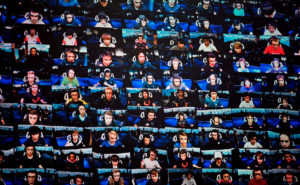It has been ten years since Facebook’s IPO. Superficially, the experience is the same: news feed, friends network, third-party apps. Yet the feel of the site has completely changed. Whether it was the parade of casual game notifications, the injection of endless clickbait and memes, or the slow ossification of discourse into like-minded and frequently vicious agreement, Facebook doesn’t feel antisocial these days so much as alien: a parade of voices each occupying a small, hermetic sphere, mostly oblivious to each other. (Of course, the alternative of having these spheres interact, as on Twitter, is far worse.)
I have seen tenured university professors post the most simple-minded memes about everything from manspreading to microaggressions. I have seen published writers buy into conspiracy theories around Trump and Biden alike. I have seen a sheer unity of sentiment dominate on issues from Covid-19 to Ukraine, demarcating increasingly limited bounds of dissent. I have watched people go from dismissing masks to evangelising them, from criticising mass media to reposting MSNBC (or Fox), from attacking Big Pharma to worshiping at the altar of Pfizer. I have seen civil wars over pronouns, literary awards, and memes. Throughout it all there has been increasing intolerance within every micro-sect, the price of disagreement turning far more quickly into stigma than ever before.
Ten years ago it was different. A general sense of bonhomie and celebration reigned. Discussion was polite; when there was disagreement, it petered out into acceptance of differences. More than anything, there wasn’t any particular impression that Facebook was looking over our shoulders at the discussion. And there wasn’t any particular sentiment that discussion mattered. We were sitting around a water cooler, shooting the shit, talking about politics and society as we would about baseball. Today, there is the incessant sense that every discussion counts, the insecure paranoia that any deviation from the right moral path is just a step down the slippery slope toward fascism — or communism, take your pick.
Is Facebook responsible for this evolution? Yes and no. Facebook the company is only partly responsible, but Facebook the service absolutely is. The heightened tone of political discourse since Brexit and Trump’s election has put the fear of god into elites and hoi polloi alike, every side convinced they are losing ground to forces with unchecked power. The Trump years became a nonstop doomscroll of panic in every direction at once. A brief glance at the other side was no better: evil corporations and Congress were hamstringing Trump’s attempts to clean the swamp, whether it was Google, George Soros, or Alexandra Ocasio-Cortez.
And yet it is Facebook that has done more than any person or company — except possibly Twitter — to produce this outcome. The story begins with FarmVille.
In the beginning, Facebook lacked a clear revenue model. Computers could learn what Amazon users wanted to buy and what Google search users were interested in, but it was hard for them to figure out what Facebook users wanted because most of the time they were just talking, and computers do not understand human speech well.
FarmVille (and its clones CityVille, CastleVille, etc.) changed this. Zynga’s addictive game hooked players into paying money to keep their crops from drying up and animals from dying, and rewarded them for advertising the game to their Facebook friends, further spreading the gospel of FarmVille. The model did not make users happy. It made them miserable, as they were always playing catch-up to keep their farm alive. Yet people continued playing. The game was free to play, but you had to pay to win.
Facebook made a remarkable portion of their revenue from Zynga’s offerings alone. By 2013, the FarmVille model had more or less burnt itself out, as there were too few who were willing to go along with its exploitative gameplay model past a certain point. The lesson, however, remained: The attention and engagement of Facebook users needed to be focused on more lucrative pastimes than merely commenting on each other’s status updates.
In the subsequent years, Facebook went through several more iterations of seeking the most viral content, all of which drew users away from the original, unprofitable model of engaging with friends and toward models of clicking, liking, sharing, and above all reacting. FarmVille had made people feel urgent and important, if only to an imaginary digital farm. There were other ways to provoke those emotions. The mid-2010s saw an explosion of clickbait in all its forms, with countless outlets on the Left and Right spitting out outrage article after outrage article in order to gain the most shares and clicks. Viral content took other forms: Buzzfeed‘s listicles, a silly dress that looked blue to some people and gold to others, and personality tests of every stripe. Engaging with and sharing this content replaced much of what Facebook had been, and the company benefited greatly, because it use this content to sell ads.
So when Facebook, reeling from the increased toxicity of rabidly angry content being spread across its platform, started de-ranking news articles and links in general starting in 2017 and 2018, it wasn’t clear what was going to fill the gap. The supposed goal was to restore civility and interpersonal connections, like what Facebook used to be. The problem was, what Facebook used to be still didn’t pay. So Facebook entered an era of genuine uncertainty, first claiming that they were going to emphasise encrypted, private communications, toying with a cryptocurrency that never took off, and finally settling on a nebulous metaverse strategy that Mark Zuckerberg is currently betting the company on.
But where did that leave Facebook users? The past did not simply disappear. Years of clicking, clickbait, and anger have quite visibly melted the minds of many people whom I knew to have been brilliant independent thinkers, but who now hop on the agreed-upon issue or outrage of the day and pontificate using received ideas that would put Bouvard and Pecuchet to shame. I was hardly immune to this tendency, prone to mindlessly Liking or forwarding something that happened to prick my dopamine receptors.
The 2010s sorted us all into our like-minded bubbles, and if everyone agrees on something within a bubble, then those people must be experts to have such uniformity of agreement. “I believe in science!” “MAGA!” “Masks4All!” Even in the absence of clickbait, hashtags and slogans now take their place, serving the same viral purpose that outrage bait and hate-clicks once did.
This is where Facebook is today. Their pursuit of engagement and attention spun far beyond what they had even intended, until they were left with an audience that had gone beyond being dumbed down into dumbing itself down. Controversy has forced Facebook into the reluctant role of ad hoc and inadequate censor, banning people for innocuous (if rude) comments while letting malignant conspiracy theories run unchecked. And everywhere, everyone is convinced that their little discussion group has the power to change the world if only it could be sufficiently policed and weaponised.
The opposite is true, of course. Having fired our dopamine receptors with the increasing sense that what we do on Facebook is consequential, our only way back to sanity is to realise that our opinions on Elon Musk buying Twitter or even Russia invading the Ukraine mean very little to most of our friends, and practically nothing to the world at large. But then there would be less reason to go on Facebook, save for its original purpose of just shooting the breeze. Facebook prefers that its users feel important, needed, and urged to participate. With the metaverse beckoning, expect more of the same.
Disclaimer
Some of the posts we share are controversial and we do not necessarily agree with them in the whole extend. Sometimes we agree with the content or part of it but we do not agree with the narration or language. Nevertheless we find them somehow interesting, valuable and/or informative or we share them, because we strongly believe in freedom of speech, free press and journalism. We strongly encourage you to have a critical approach to all the content, do your own research and analysis to build your own opinion.
We would be glad to have your feedback.
Source: UnHerd Read the original article here: https://unherd.com



